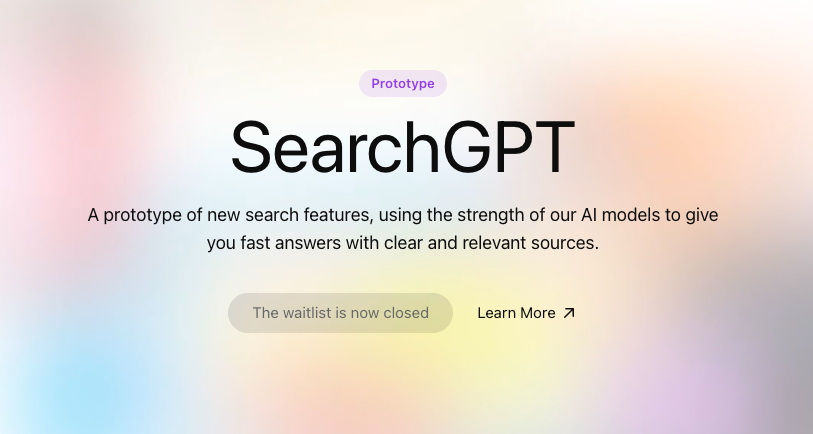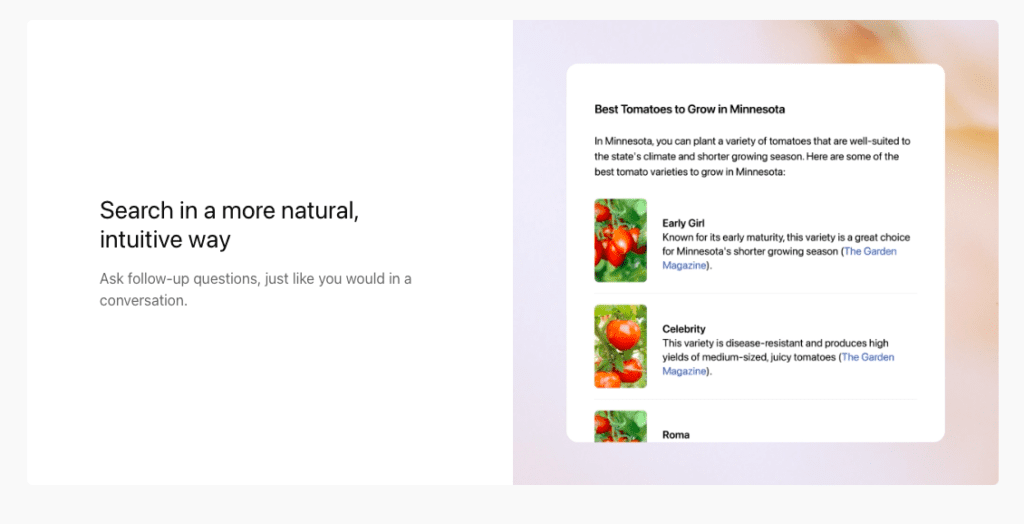Artificial Intelligence (AI) is transforming industries at a rapid pace, and the world of search engines is no exception. The introduction of OpenAI’s SearchGPT represents a significant development in AI-powered search technology. But what exactly is OpenAI’s SearchGPT, and how will it impact traditional Search Engine Optimization (SEO) and Google Search? Could it eventually compete with established search engines like Google or Bing, and what changes will businesses and SEO professionals need to make to adapt?
In this article, we’ll dive into the technology behind OpenAI’s SearchGPT, explore its unique features, compare it to traditional search engines like Google, and examine the potential long-term implications for SEO and digital marketing strategies.

What is SearchGPT?
At its core, SearchGPT is a groundbreaking, AI-powered search engine developed by OpenAI. Built upon the success of ChatGPT, it integrates conversational AI with real-time web search capabilities. Unlike traditional search engines that depend on indexing and ranking pages based on algorithms, SearchGPT provides users with up-to-date information retrieved directly from the web at the time of the search. This represents a new direction in AI search technology, offering a more conversational and intuitive search experience.
This shift toward real-time data means users are getting the freshest and most relevant information available. SearchGPT also incorporates the conversational abilities of ChatGPT, enabling a more natural, interactive search experience compared to Google. Instead of refining search queries over and over again, users can simply ask follow-up questions, creating a dynamic search environment that evolves as the conversation progresses. The SearchGPT prototype is still under development, aiming to challenge Google’s dominance by delivering concise answers instead of links, emphasizing its AI-driven capabilities.
Additionally, SearchGPT goes beyond keyword-based search queries by offering in-depth responses and personalized interactions. This makes it more accessible to users who may not be familiar with the nuances of search engine behavior or complex keyword queries.

Key Features of SearchGPT
SearchGPT introduces several unique features that set it apart from traditional search engines like Google:
- Real-Time Data Retrieval: SearchGPT accesses real-time data from the web, providing users with the most current information available. Unlike Google’s pre-indexed content, SearchGPT pulls in live data, ensuring users are always accessing up-to-the-minute information. By utilizing a comprehensive web index, SearchGPT enhances the accuracy and relevance of its search results, integrating trusted information sources to improve performance. This is particularly valuable in fast-paced industries such as finance, medicine, and current events.
- Conversational Interface: SearchGPT excels at handling conversational queries, allowing users to ask follow-up questions seamlessly. This feature mirrors the conversational style of ChatGPT, where users can refine their queries or ask for clarification without needing to rephrase or start a new search.
- Source Attribution and Transparency: SearchGPT places a premium on transparency by providing direct citations and links to original content sources. This not only boosts the credibility of the information provided but also supports content creators by driving traffic back to their websites. This approach contrasts with some AI tools that lack clear source attribution, offering a more ethical and user-friendly search experience.
- Integration with ChatGPT: One of the most exciting aspects of SearchGPT is its integration with ChatGPT, enabling users to blend search queries with conversational interactions. This integration promises to create a unified search tool that offers both search functionality and interactive dialogues.
- Visual and Multimedia Search: Although still in development, SearchGPT is expected to introduce visual answers in its search results. By incorporating visual data into responses, SearchGPT could make complex information more accessible and easier to understand. This feature will likely revolutionize how users consume information, making searches more engaging and interactive.

How SearchGPT Stacks Up Against Traditional Search Engines like Google Search
Google’s AI Overview vs. SearchGPT
Google has long been a leader in search, continuously enhancing its platform with AI-powered features. Google’s AI Overviews, for example, provide AI-generated snippets that offer concise answers to user queries at the top of the search results. However, while Google offers these features as an enhancement to its traditional search model, SearchGPT takes a more integrated approach.
One of the main distinctions between the two platforms is how they handle user interaction. SearchGPT’s conversational interface allows for follow-up questions, creating a more interactive and personalized search experience. Additionally, the use of a popup window in SearchGPT enhances user interaction by providing immediate access to AI chat functionalities, negating the need for separate applications or websites. In contrast, Google’s AI Overviews are more static and require users to manually refine their search queries to dive deeper into topics.
Another important difference is in how each platform handles source attribution. SearchGPT is more transparent, offering direct links to content creators’ websites, which helps drive traffic and ensures the information is properly credited. On the other hand, Google’s AI-generated results often obscure the sources behind small icons, making it less intuitive for users to explore the original content.
Real-Time Data vs. Indexed Content
One of the most revolutionary aspects of SearchGPT is its ability to retrieve real-time data. Traditional search engines like Google rely on indexed content, which is periodically updated based on algorithms. This can sometimes mean that users are accessing information that is outdated or no longer relevant. SearchGPT’s real-time retrieval ensures that the information provided is as current as possible, making it particularly useful for time-sensitive topics such as breaking news or financial updates.

Will SearchGPT Change SEO?
The introduction of SearchGPT could significantly alter the SEO landscape. Here are some of the key ways it might change SEO strategies:
1. Conversational Search and Topic Relevance
SearchGPT’s reliance on natural language processing (NLP) means that search queries are becoming more conversational. This represents a shift from traditional SEO practices that focus on optimizing content for specific keywords. Instead, content creators will need to focus on providing in-depth, topic-relevant content that addresses user intent and anticipates follow-up question.
For SEO professionals, this means shifting strategies toward creating comprehensive content that covers a subject holistically. This content should be designed to engage users in a conversation-like search journey, providing answers to both the main query and any related follow-up questions that users might ask.
2. Content Freshness and Real-Time Optimization
As SearchGPT prioritizes real-time data, the importance of keeping content fresh and up-to-date cannot be overstated. Websites that regularly update their content to reflect new developments will be better positioned to rank higher in SearchGPT’s results. This marks a shift away from static, evergreen content and emphasizes the importance of dynamic, real-time content that evolves with the latest information.
SEO strategies will need to focus on continuously optimizing content to remain relevant and timely. Businesses that fail to keep their content fresh may find themselves pushed down in the rankings as SearchGPT favors more current information.
3. Importance of Structured Data and Schema Markup
Structured data is becoming increasingly important as AI-driven search engines like SearchGPT rely on schema markup to categorize and understand content. Implementing structured data will be crucial for improving content visibility on SearchGPT. SEO professionals should prioritize adding relevant schema tags that help SearchGPT identify and rank content more accurately.
By ensuring that their websites are optimized with structured data, businesses can improve their chances of being discovered by AI-powered search engines, giving them a competitive advantage in the new SEO landscape.
4. User Engagement and Conversion Optimization
With SearchGPT providing direct answers to user queries, the traditional customer journey will change. Users arriving at websites from SearchGPT will likely be more informed and closer to making decisions. This makes user engagement and on-site experience critical for SEO success.
SEO professionals will need to focus on optimizing websites for engagement metrics such as time on site, bounce rates, and interaction with content. Websites that provide high-quality, engaging user experiences will not only improve their SEO performance but also increase conversion rates.

Can Users and Businesses Leverage OpenAI’s Search Engine SearchGPT?
For Users
SearchGPT offers a more intuitive and personalized search experience by allowing users to engage in natural, conversational queries. This makes it easier for users to refine their search results without needing to rephrase or start a new query. For non-technical users, this conversational approach reduces the complexity of navigating search engines.
For Businesses
From a business perspective, optimizing for SearchGPT means adapting to the evolving nature of search. Businesses will need to focus on creating conversational, topic-based content that addresses a wide range of user queries. Implementing structured data and ensuring content is frequently updated will also be crucial for maintaining visibility on SearchGPT.
Moreover, building authority and credibility will be more important than ever. AI-powered search engines like SearchGPT are more likely to feature content from trusted, authoritative sources. Businesses that invest in building their brand’s authority will have a better chance of being included in SearchGPT’s responses.
The Future of SEO and Digital Marketing
As AI-powered search engines like SearchGPT continue to grow in popularity, traditional SEO practices will need to evolve. Metrics such as click-through rates (CTR) and traditional search rankings may become less relevant as AI-driven engines focus more on brand visibility, content quality, and user engagement.
Additionally, as SearchGPT currently offers an ad-free experience, businesses will need to consider new ways to monetize digital marketing efforts. Over time, it’s possible that new advertising models will emerge within AI-driven search platforms, reshaping the way businesses approach online marketing.
Conclusion
In conclusion, SearchGPT is set to be a major player in the evolving search engine landscape. With its real-time data retrieval, conversational search capabilities, and commitment to source transparency, it offers a fresh alternative to traditional search engines like Google. For SEO professionals and businesses, this means adapting to a new era of search that prioritizes real-time information, conversational content, and structured data.
As AI-driven search continues to evolve, businesses that embrace these changes and adjust their SEO strategies accordingly will be better positioned to succeed in this rapidly changing digital world. See how Elevato can help you leverage AI for improved results.
